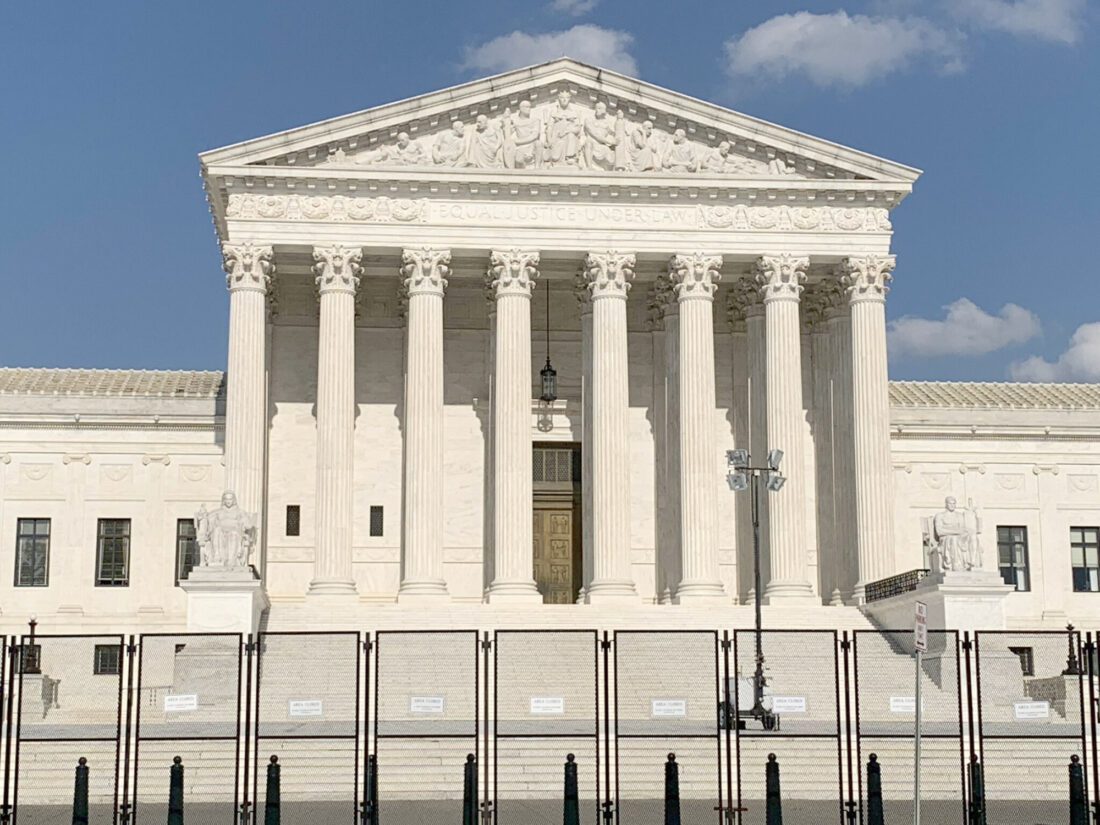Whitmer asks US Supreme Court to weigh state immunity in Line 5 case

The U.S. Supreme Court’s front steps in Washington, D.C., in July 2022. (Katherine Dailey/Michigan Advance)
After a federal appeals court held that Michigan is not immune to legal action for its decision to revoke a Canadian energy company’s easement to operate a pipeline in the Great Lakes, the Whitmer Administration is seeking an appeal to the United States Supreme Court.
In a petition filed Nov. 13, attorneys for the state have asked the high court to weigh whether the state is entitled to legal immunity in cases where a private entity seeks relief that would diminish the state’s ownership and control of its own lands.
Attorney General Dana Nessel argued the Sixth Circuit Court of Appeals erred when it agreed that Enbridge Energy’s case against Gov. Gretchen Whitmer and Scott Bowen, the director of the Michigan Department of Natural Resources, fell within the exceptions to sovereign immunity, which prevents a state from being sued in state or federal courts without its consent.
“This Court’s intervention is urgently needed because the Sixth Circuit’s rule strikes at not one, but two core attributes of statehood: a State’s immunity from suit and its dominion over sovereign lands,” attorneys for the state wrote in their petition.
Enbridge filed its lawsuit against the state in response to Whitmer’s decision to revoke and terminate its permit to operate the Line 5 pipeline on the bottomlands of the Straits of Mackinac, where Lake Michigan and Lake Huron meet.
Whitmer and Nessel, along with Native American tribes and environmental activists, have raised alarms about the potential for the pipeline to rupture, with one University of Michigan researcher concluding the Straits of Mackinac are the “worst possible place” for a Great Lakes oil spill.
While the state argued Enbridge had repeatedly violated the easement’s terms, the company argued that the governor and the Department of Natural Resources have no authority over pipeline safety matters and that the termination of their permit ran afoul of the Federal Pipeline Safety Act and the 1977 transit pipelines treaty with Canada.
The Sixth Circuit Court’s ruling made clear that its lawsuit falls under the exception to sovereign immunity, Enbridge spokesperson Ryan Duffy said in an email.
“As a key component of interstate and international commerce, Line 5 transports critical energy resources across the region. Its importance is reinforced by the 1977 Transit Pipelines Treaty between the United States and Canada, which affirms Line 5’s function as an international energy conduit,” Duffy said. “The Treaty explicitly prohibits unilateral actions by public authorities, including State of Michigan officials and its courts, to shut down the pipeline.”
Although Enbridge was given until Dec. 17 to respond to the state’s petition to the Supreme Court, the company filed a document noting it does not intend to respond.
———
Michigan Advance is part of States Newsroom, a national 501(c)(3) nonprofit. For more, go to https://michiganadvance.com.





